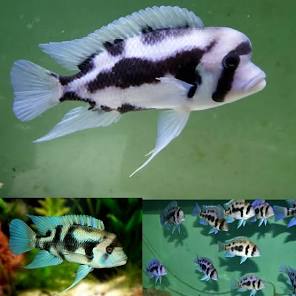1
/
of
1
Midwest Aquarium and Pond Supplier LLC
(136)Black Widow Frontosa 2-3''
(136)Black Widow Frontosa 2-3''
Regular price
$45.00 USD
Regular price
Sale price
$45.00 USD
Shipping calculated at checkout.
Quantity
Couldn't load pickup availability
The Black Widow Frontosa (Cyphotilapia sp. hybrid) is a selectively bred variation of the classic Frontosa cichlid, originally from Lake Tanganyika in Africa. Instead of the wild-type vertical barring, the Black Widow exhibits a unique and irregular pattern of black and white, with no two individuals looking exactly alike. This variant is a highly sought-after showpiece for experienced African cichlid hobbyists
Tank and water requirements
Because of its large size and specific water needs, the Black Widow Frontosa requires a sizable, species-appropriate aquarium.
- Tank size: A minimum of 75 gallons is required for a small group, with 125 gallons or more recommended for a full-sized adult group.
- Substrate: Use fine sand or a substrate specifically designed for African cichlids. These fish have sensitive gills and prefer to live in conditions that replicate Lake Tanganyika's.
- Filtration: A powerful and robust filtration system is essential, as these large cichlids produce a significant amount of waste.
-
Water parameters: Frontosas require very stable and alkaline water conditions.
- Temperature: 75–80°F (24–27°C).
- pH: 7.8–8.6.
- Water changes: Weekly water changes are important for keeping nitrates low and ensuring pristine water quality.
- Decorations: Mimic their deep-water, rocky natural habitat by providing plenty of caves and hiding places using stacked rocks and large pieces of driftwood.
- Lighting: Frontosas prefer subdued lighting, which emulates the deeper waters they inhabit in the wild.
Diet and feeding
Frontosas are carnivorous, and their diet in the wild consists of fish and crustaceans. In a home aquarium, a varied diet is key to maintaining health and vibrant coloration.
- Protein: Feed a high-quality carnivorous cichlid pellet as the staple food. Supplement with frozen foods such as brine shrimp, mysis shrimp, and chopped fish or krill.
- Avoid: Do not feed live feeder fish, as they can carry diseases. Avoid fatty foods like beef heart, as Frontosas cannot properly metabolize the lipids.
Temperament and tank mates
- Temperament: Despite their size, Frontosas are generally peaceful cichlids, though they are predatory toward any fish small enough to fit in their mouths. They have a well-defined social hierarchy and can be territorial.
- Group keeping: Frontosas do best when kept in groups of five or more, with one male and several females. This helps to distribute aggression and encourages a more natural social dynamic.
-
Compatible companions: Choose other large, peaceful, or semi-aggressive African cichlids that can tolerate similar water parameters. Suitable options include:
- Other Frontosas from different regions of Lake Tanganyika.
- Haplochromis and Peacock Cichlids (ensure they are not too small).
- Large, peaceful catfish, like certain species of Synodontis.
- Incompatible companions: Do not house them with smaller fish, aggressive Mbuna cichlids, or species that prefer significantly different water conditions.
Breeding
Frontosas are maternal mouthbrooders, with the female carrying eggs and fry in her mouth for up to several weeks for protection. Breeding them in a home aquarium requires stable, ideal water conditions and a healthy male and female pair.
Share
No reviews

